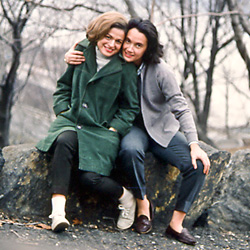Federal Court Declares “Defense of Marriage Act” Unconstitutional

FOR IMMEDIATE RELEASE
CONTACT: (212) 549-2666; media@aclu.org
NEW YORK – A federal judge ruled today that a critical section of the so-called “Defense of Marriage Act” (DOMA) unconstitutionally discriminates against married same-sex couples. Today’s decision joins four other federal courts that have struck down DOMA under the Constitution.
The statute had been challenged by Edith “Edie” Windsor, who sued the government for failing to recognize her marriage to her partner Thea Spyer, after Spyer’s death in 2009. Windsor and Spyer were married in Canada in 2007, and were considered married by their home state of New York.
“Thea and I shared our lives together for 44 years, and I miss her each and every day,” said Windsor. “It’s thrilling to have a court finally recognize how unfair it is for the government to have treated us as though we were strangers.”
In her lawsuit, Windsor argues that DOMA violates the equal protection guarantee of the U.S. Constitution because it requires the government to treat same-sex couples who are legally married as though they were not, in fact, married. Windsor's lawsuit was filed by the law firm of Paul, Weiss, Rifkind, Wharton & Garrison LLP, the American Civil Liberties Union and the New York Civil Liberties Union.
The Obama administration declined to defend the statute in court in February, 2011, so the House of Representatives’ Bipartisan Legal Advisory Group appointed an attorney to represent the government in the case.
When Thea Spyer died in 2009, she left all of her property to Windsor, including the apartment they shared. Because they were married, Spyer's estate normally would have passed to her spouse without any estate tax. But because DOMA prevents recognition of the otherwise valid marriages of same-sex couples, Windsor had to pay more than $363,000 in federal estate taxes.
“This decision adds to what has become an avalanche of decisions that DOMA can’t survive even the lowest level of scrutiny by the courts,” said James Esseks, Director of the ACLU Lesbian Gay Bisexual and Transgender Project.
Windsor, a senior computer systems programmer, and Spyer, a clinical psychologist, met in the early 1960s, and lived together for more than four decades in Greenwich Village. Despite not being able to get legally married, they were engaged to each other in 1967. Spyer was diagnosed with multiple sclerosis, and Windsor helped her through her long battle with the disease. They were finally legally married in May 2007.
Roberta A. Kaplan, an attorney for Windsor, added, “Although we expect the attorneys for the House of Representatives to appeal today's decision, we are confident that it will be affirmed on appeal, and we hope that the court will do so expeditiously given that our client is 83 years old.”
“Today’s decision is a victory for families and a victory for human rights,” said New York Civil Liberties Union senior staff attorney Melissa Goodman. “Now, all loving couples in our state can truly enjoy the dignity, respect and legal rights that marriage provides.”
More on this case can be found at: www.aclu.org/edie

